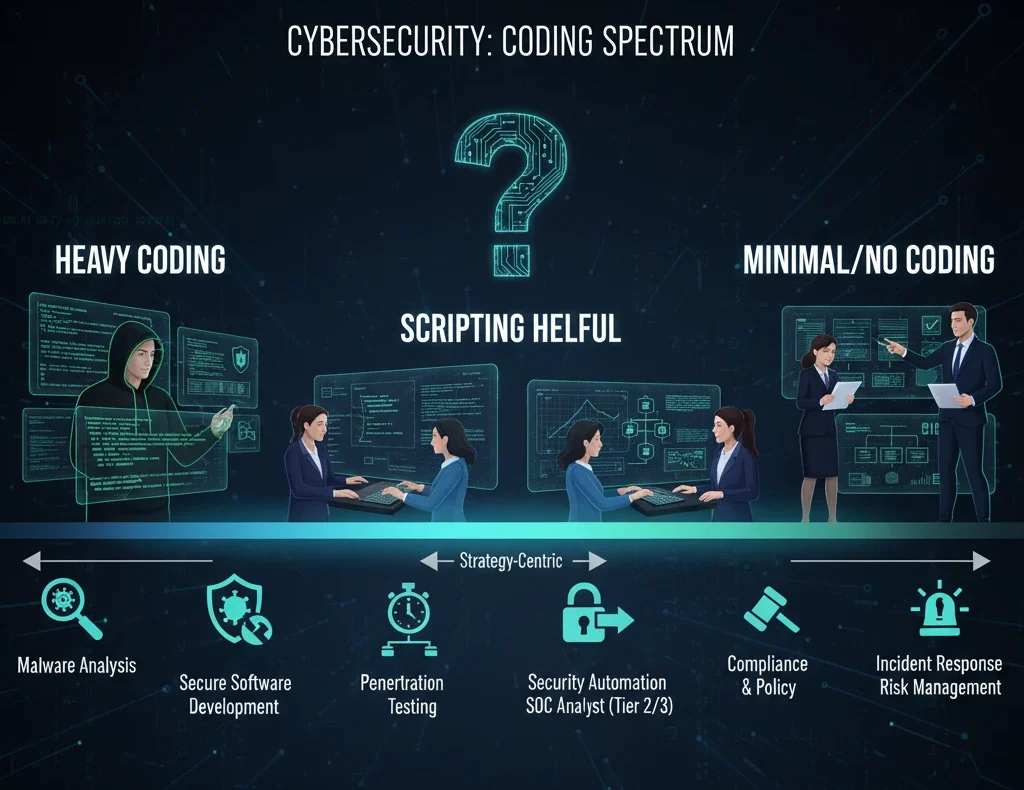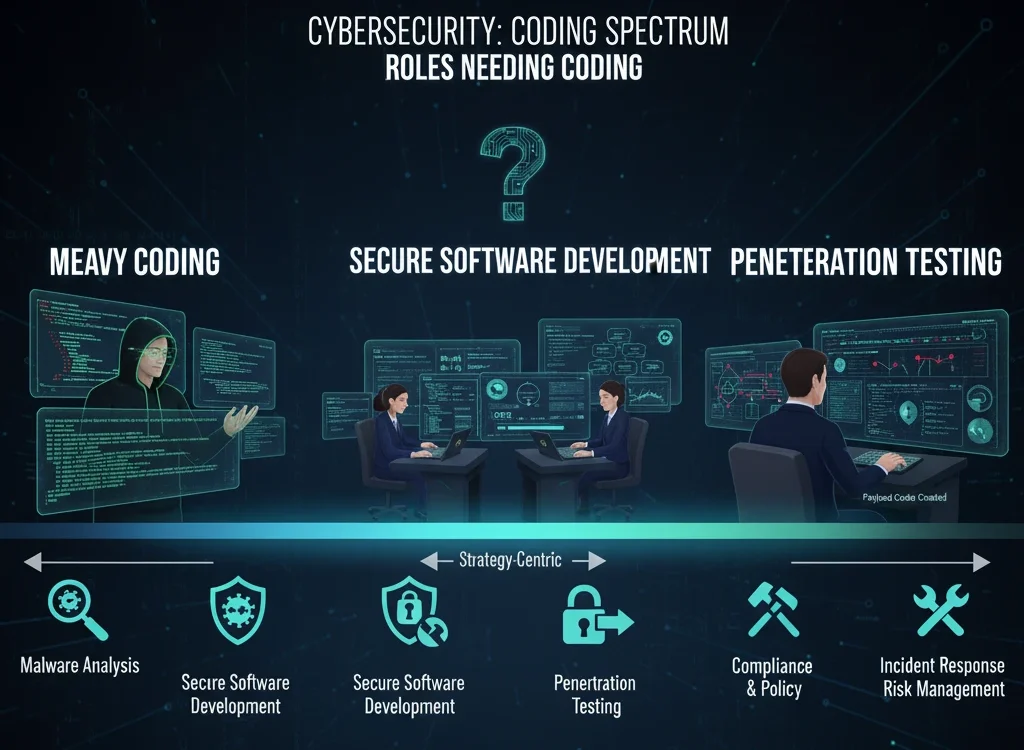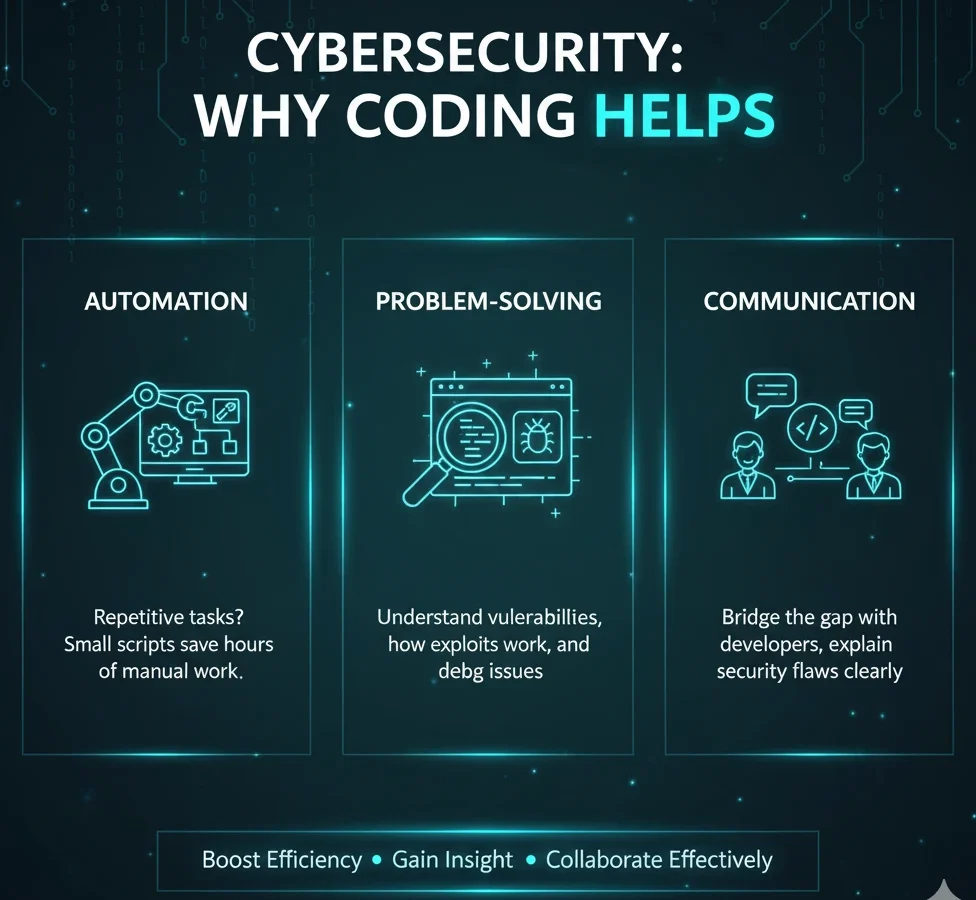Does Cybersecurity Require Coding?

Lately, I’ve been hearing a lot of people ask: “Do I need to know coding to get into cybersecurity?” Honestly, it’s not a simple yes or no.
Cybersecurity is growing fast these days. Almost every week, there’s news about stolen data, ransomware, or hacked accounts. It’s no wonder so many people are curious about working in this field. Whether you need to learn coding really depends on what part of cybersecurity you want to pursue.
Understanding Cybersecurity
Cybersecurity is mostly about keeping computers and networks safe from people who want to steal information or break things. Some days, it feels like all you do is watch for problems that haven’t even happened yet, hoping nothing goes wrong while staring at screens.
There are many different roles in cybersecurity:
- Some people monitor networks all day to spot intrusions.
- Others legally try to break into systems to find weaknesses.
- Some respond when issues occur, fixing problems quickly.
- Others analyze threats or assess risks.
Whether coding is needed depends on the job. Some roles barely touch programming, while others require writing small scripts or using software to figure things out.
Cybersecurity Roles That Often Need Coding
Certain cybersecurity jobs definitely benefit from coding. It’s usually not about writing huge programs but about small scripts and understanding how code works.

Penetration Tester (Ethical Hacker)
Pen testers are the ones who try to break into systems legally before malicious hackers do. They often write small scripts or programs to test weaknesses and automate repetitive tasks. Python, Bash, or PowerShell are commonly used.
Security Engineer or Analyst
These professionals monitor systems, check logs, manage firewalls, and sometimes tweak scripts or create small programs to automate security tasks.
Malware Analyst / Reverse Engineer
People in this role study malware to understand how it works. Knowledge of C, C++, or assembly helps in analyzing and reversing malware effectively.
Cybersecurity Roles That Don’t Require Much Coding
Not every cybersecurity job requires coding. Many roles focus on strategy, monitoring, or management:
- Security Consultant / Advisor
These individuals evaluate a company’s security policies, provide advice, and ensure compliance. Coding isn’t necessary.
- Incident Response Coordinator
This role involves managing security incidents, working with teams to handle breaches and find solutions. Coding is rarely needed.
- Compliance and Risk Specialist
This job focuses on rules, audits, and risk assessment. While understanding systems helps, coding is not essential.
For these roles, knowing how systems work and how hackers might exploit them matters far more than coding.
Why Knowing Some Coding Helps
Even if coding isn’t required, understanding a bit of it can make life easier:
- Automation: Many tasks are repetitive. Small scripts can save hours of manual work.
- Problem-Solving: Knowing code helps you understand how vulnerabilities occur and how attackers might exploit them.
- Communication: If you work with developers, knowing basic coding concepts makes it easier to explain security problems.

Recommended Languages:
- Python: beginner-friendly, good for scanning networks, testing security, and analyzing logs.
- Bash scripting: useful for automating tasks on Linux systems.
Learning Without Coding
You don’t need to know coding to start a cybersecurity career. You can focus on security fundamentals, networks, and system management. Tools like Wireshark, Nessus, and Splunk are effective without writing code.
Key knowledge areas include:
- Understanding how networks operate and how to protect them.
- Familiarity with operating systems like Windows and Linux.
- Spotting and responding to threats.
- Learning security rules, policies, and frameworks.
Even minimal coding knowledge can be helpful later, but it’s not a barrier to entry.
Conclusion
So, do you really need coding for cybersecurity? Honestly, it depends on where you want to end up. If your dream is to poke around systems like an ethical hacker or break down nasty malware, then yes—you’ll want to pick up some coding along the way. But if your strengths are more in planning, policy, or helping teams respond when something goes wrong, you can still build a great career without ever writing much code.
That said, knowing even a little bit of coding makes life easier. A quick Python script can save you hours of boring work, and being able to “speak the language” helps when you’re working with developers. But don’t let the idea of coding stop you from starting. Most people begin by learning networks, operating systems, and basic security tools, then add coding skills gradually as the need arises.
Bottom line: coding isn’t a strict ticket into cybersecurity—it’s more like an extra key that unlocks more doors as you grow.
Got it. A short internal link line at the end of your block of content, related to “Does Cybersecurity Require Coding?”:
Short Internal Link Line:
“Curious about foundational tech skills? Explore our guide on Data Structures in Dynamic programming.“

